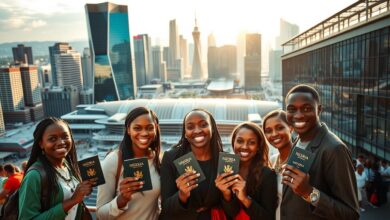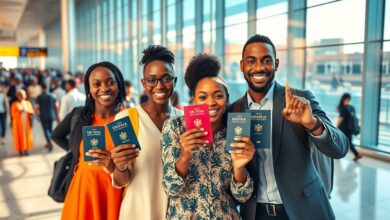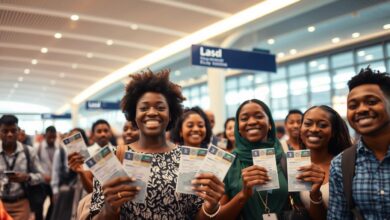Australia Sponsorship Visa: Work Pathways for Nigerian Migrants
This section talks about how Nigerian nationals can find jobs and live in Australia with visa sponsorship. It shows why this is important for Nigerians. It also explains the different ways to get a visa, from temporary work permits to permanent residency.
Australia needs skilled workers in many fields like health care, engineering, and IT. The Department of Home Affairs focuses on these areas. They also support jobs in regional areas, making sponsored roles key for moving to Australia.
Nigeria is a big source of skilled workers for Australia. Nurses from Lagos, software developers from Abuja, and engineers are in demand. Employers in Australia use visa sponsorship to quickly hire the right people.
The next article will cover everything you need to know about Australian visa sponsorship. It will talk about who can apply, the different visa types, and how to apply. It will also cover employer duties, benefits for families, common issues, and future changes. You’ll learn how to understand visa sponsorship, prepare documents, and navigate the migration process.
Understanding Visa Sponsorship in Australia
Visa sponsorship in Australia offers work chances for Nigerians in Australia. It’s when an employer supports a foreign worker through visa steps. This guide explains the difference between employer-backed and independent skilled migration.
What is Visa Sponsorship?
Visa sponsorship means an Australian employer offers a job to a foreign worker. The employer must meet legal duties for that job. The worker then applies for a visa.
How Does Visa Sponsorship Work?
The process has two main parts. First, the employer gets sponsor approval and nominates a job. Then, the worker applies for the visa and meets health, character, and English needs.
Steps include getting sponsorship and nomination approval, applying via ImmiAccount, health checks, and a visa decision. Regional Certifying Bodies check roles for regional visas. Quick communication and correct documents help speed up the process.
Types of Sponsorship Visas
There are several visas for Nigerian applicants. Temporary Skill Shortage (subclass 482) is for short and medium-term jobs. Employer Nomination Scheme (subclass 186) is for permanent jobs.
- Temporary Skill Shortage (482): short and medium-term placements.
- Employer Nomination Scheme (186): medium to permanent employment.
- Skilled Employer Sponsored Regional (494): regional employer support in Australia.
- Temporary Work (Short Stay Specialist) (400): short specialist assignments.
Visas differ in length, testing needs, and who can apply. It’s important to choose the right visa based on your skills and goals. Employers are key in getting visas for skilled workers.
Eligibility Criteria for Nigerian Applicants
Nigerian applicants wanting to work in Australia must first pass some checks. They need a valid passport, health exams, and police certificates. They also have to show they can speak English well, with tests like IELTS or PTE.
Applicants must be of a certain age and have work experience in their field. They can’t have had a visa cancelled before. These rules help ensure only the right people get to work in Australia.
General Eligibility Requirements
Most visas need proof of work and a clean record. This includes pay slips, tax records, and letters from employers. English tests must meet certain levels for the visa.
Meeting these requirements makes applicants more competitive. It helps them move towards residency in Australia.
Specific Requirements for Different Visas
- Subclass 482 (Temporary Skill Shortage): Employers must nominate. Applicants need two or more years of experience and a skill level that matches ANZSCO. Some jobs require English tests, and employers might need to prove they can’t find local workers.
- Subclass 186 (Direct Entry): A positive skills assessment is needed, along with three years of experience for some jobs. Employers must nominate and get approval from an Australian business.
- Subclass 494 and pathways to permanent options like 191 or 186 via Temporary Residence Transition: Working for the employer for a certain time can lead to permanent residency.
- Regional visas such as subclass 494: Applicants must live and work in certain areas. Employers need approval as regional sponsors.
Importance of Skills Assessment
Many visas need a skills assessment from recognized bodies. These include VETASSESS, Engineers Australia, and the Australian Nursing and Midwifery Accreditation Council. A positive assessment shows qualifications and experience meet Australian standards.
Applicants should prepare with certified documents, reference letters, and job details. Processing times vary. Not getting a positive assessment can lead to visa refusal or delays.
Having accurate documents and early preparation with assessors is key. For Nigerians, meeting Australian standards helps meet the demand for skilled workers. It also supports the path to residency in Australia.
Types of Sponsorship Visas Available
Australia offers visa pathways for skilled workers from Nigeria. These paths help meet job sponsorship demand and open up Australian workforce opportunities. We’ll look at the main streams, their rules, and how employers and applicants work together.
Employer-Sponsored Visas
Employer-sponsored visas include both temporary and permanent options. Employers must nominate a job that fits the ANZSCO list and meet sponsorship obligations.
These obligations include providing real work, meeting training standards, and ensuring the agreed salary. Some temporary visas can lead to permanent residency through schemes like the Employer Nomination Scheme.
Temporary Skill Shortage Visa
The Temporary Skill Shortage visa (subclass 482) has three streams: short-term, medium-term, and labour agreement. Each stream has its own rules and stay limits.
The medium-term stream allows stays up to four years for jobs on the Medium and Long-term Strategic Skills List. Jobs on the Short-Term Skilled Occupation List are for the short-term stream. Family members can usually be included.
Employers must prove they’ve tested the labour market and meet training and pay standards. These rules ensure fair Sponsored work permits Australia and hold employers accountable.
Regional Sponsored Visas
Regional sponsored visas aim at filling gaps outside big cities, in areas like agriculture, healthcare, and construction. Examples include the Skilled Employer Sponsored Regional (subclass 494) and related schemes that offer permanent residency paths.
Regional sponsorship can offer state or territory nomination and priority processing. These visas help fill the skilled labour needs in communities that need it most.
- Employer support in Australia helps match local needs with overseas skills.
- Job sponsorship demand Australia remains strong in regional sectors.
- Sponsored work permits Australia can be a stepping stone to long-term residency.
Process of Applying for Visa Sponsorship
Getting a sponsored job in Australia needs clear steps and the right documents. This guide helps Nigerians understand Visa Sponsorship Australia. It shows how sponsored work permits fit into the bigger picture of moving to Australia.
Step-by-Step Application Guide
- First, check if your job is in demand in Australia using ANZSCO listings.
- Then, get a job offer from an Australian employer who will sponsor you.
- The employer must become an approved sponsor or nominate the job for you.
- You need to pass a skills assessment and gather your certified documents.
- Next, apply for the visa through ImmiAccount, pay fees, and get health and police checks.
- Be quick to answer any questions from the Department of Home Affairs and wait for their decision.
- If you get the visa, get ready to move, meet visa conditions, and confirm your start date with your employer.
Key Documents Required
- You’ll need your passport, travel documents, and certified education certificates.
- Employment references that show your job duties and dates are also required.
- Skills assessment results, police clearance certificates, and English test scores are needed too.
- Medical reports from approved clinics and documents for family members are also necessary.
- Finally, you’ll need a letter from your employer, an employment contract, and proof of sponsorship approval.
Common Application Mistakes to Avoid
- Don’t submit incomplete or unverified documents that can slow down the process.
- Make sure your employment dates and job duties match in all references.
- Provide enough evidence of relevant experience for the job you’re applying for.
- Don’t forget to include English language scores and medical and police checks.
- Use the correct ANZSCO occupation code for your role.
- Always use a registered migration agent for complex cases.
Preparing early can help avoid mistakes and make the process smoother. Following the Department of Home Affairs’ advice and using a registered migration agent can increase your chances of getting a sponsored work permit in Australia. This can lead to a successful move to Australia in the long run.
The Role of Australian Employers
Australian employers are crucial in helping Nigerian professionals find jobs. They support by making hiring decisions, offering training, and following visa rules. Job seekers need to understand how employers find talent and what sponsorship entails.
Finding Sponsorship Opportunities
Job seekers should check out Australian job boards like Seek and Indeed Australia. LinkedIn and employer websites are also good sources. Recruitment agencies that list sponsored roles can help match skills with demand.
CVs should be tailored to Australian standards and highlight certified qualifications. Professional associations in nursing, IT, engineering, and trades publish job openings. They also guide on eligibility.
Joining diaspora networks and alumni groups can lead to job opportunities. These connections offer advice on Job sponsorship demand Australia and where to find Australian workforce opportunities.
Employer Obligations in Sponsorship
Approved sponsors must ensure nominated roles are real and pay a market salary. They must also provide terms and conditions similar to those for local staff.
Employers need to keep records of employment and training. They might have to contribute to training funds or meet certain visa training benchmarks. The Department of Home Affairs audits sponsors and can impose penalties for non-compliance.
Penalties include sponsorship cancellation and financial fines. Clear compliance is essential for both employers and sponsored workers as Skilled worker demand Australia grows.
Industries Actively Seeking Sponsored Workers
Healthcare, IT, engineering, construction, and trades are in high demand. Hospitals and aged care providers need nurses and allied health staff. IT firms look for software developers, data analysts, and cloud engineers.
Engineering employers seek civil and electrical specialists. Construction and trades companies need plumbers, electricians, and carpenters. Regional agriculture and food processing businesses offer seasonal and ongoing roles.
Nigerian professionals with relevant training have strong Australian workforce opportunities. Matching skills to industry demand increases the chance of employer sponsorship and a successful move to Australia.
Benefits of Australian Visa Sponsorship
Visa sponsorship in Australia offers skilled migrants big advantages. It opens up new job opportunities, supports family needs, and helps with long-term settlement. We’ll look at how sponsored workers get new jobs, what families can expect, and how to move from temporary to permanent residency.
Access to Diverse Work Opportunities
Sponsorship opens the door to a wide range of jobs in healthcare, construction, IT, and hospitality. Companies like BHP, Telstra, and Ramsay Health hire skilled workers. They also protect them under Australian law.
Workers often earn more than in Nigeria and get paid leave. Employers also help with professional growth and getting certified by bodies like AHPRA or Engineers Australia.
Benefits for Families of Sponsored Workers
Dependent visas cover spouses and kids, giving families access to schools and TAFE. Medicare benefits vary by visa type, but many families get healthcare coverage.
Spouses might get work rights, depending on the visa. It’s important to list dependents during the application to get the right benefits and avoid delays.
Pathway to Permanent Residency
Some sponsored visas lead straight to permanent residency. For example, the Employer Nomination Scheme (subclass 186) offers direct entry or nomination for qualified workers.
The Temporary Residence Transition stream helps 482 visa holders meet work experience needs with their employer. Regional sponsorship can also lead to permanent residency for those in regional roles.
Permanent residency means you can apply for citizenship, get full access to social services, and settle long-term. These opportunities make Australia a great choice for Nigerian talent looking to grow their careers and secure their families’ future.
Challenges Faced by Nigerian Migrants
Nigerian migration to Australia brings hope for new careers and family stability. The move also brings practical hurdles that affect daily life and work. Three common areas demand attention: language, culture, and credential recognition.
Language Barriers
Strong English skills matter for job entry and promotion. Many employers ask for IELTS, PTE, or OET scores before hiring. Candidates who prepare for these tests improve interview success and workplace confidence.
Short courses in English for Academic Purposes and workplace communication training help bridge gaps. Community language support services and local library programs offer affordable practice. Better fluency speeds access to Australian workforce opportunities.
Cultural Adjustments
Adapting to Australian workplace norms takes time. Expectations include punctuality, direct feedback, and clear adherence to health and safety rules. Workers from Nigeria may need guidance on these behaviors to fit team routines.
Social integration varies by city. Multicultural community centers, Nigerian diaspora groups in Sydney and Melbourne, and state settlement services provide practical support. These resources reduce isolation and ease Cultural adjustments Australia requires.
Recognition of Qualifications
Not all Nigerian degrees map directly to Australian standards. Applicants often need a formal skills assessment from bodies such as Engineers Australia, VETASSESS, or the Australian Nursing and Midwifery Accreditation Council. This step clarifies whether additional training or licensing is required.
Bridging programs, local certification, and supervised practice help professionals meet local rules. Strong planning around Recognition of qualifications lowers delays and improves access to Australian workforce opportunities.
Success Stories of Sponsored Workers
Many Nigerian talents in Australia have found stable jobs and grown their careers. Their stories offer practical advice for those seeking Australian visa sponsorship. They talk about skills assessment, employer nomination, English and health checks, and career moves after arrival.
Case Studies of Successful Migrants
A software developer got a Temporary Skill Shortage (subclass 482) in Sydney. They passed skills assessment and English tests. Then, they moved to subclass 186 with employer nomination.
A registered nurse got a job at a regional hospital under a sponsored visa. They met registration standards and completed continuing professional development. They also used local support to settle in.
A tradesperson filled regional construction demand and arrived on a sponsored visa. They completed skills assessment and gained workplace safety certifications. Later, they applied for permanent residency after meeting regional work requirements.
Testimonials from Sponsored Professionals
Professionals say recruitment agencies and employer HR teams help with sponsored work permits. They stress the importance of thorough documentation and realistic timelines.
Many talk about employer support for relocation, which helped with housing and living costs. Some found professional licensure steps challenging, especially for regulated roles. They recommend early preparation for credential checks.
Lessons learned include proactive upskilling and clear communication with sponsors. Success stories highlight persistence, accurate paperwork, and using community resources during the visa journey.
Insights into Living and Working in Australia
The cost of living varies between major cities and regional centers. Sponsored workers advise budgeting for initial housing expenses and exploring regional options where demand for labor can be higher.
Workplace rights, tax obligations, and health access are important from day one. New arrivals should apply for a Tax File Number, understand superannuation, and enrol in Medicare where eligible or obtain private health insurance if required.
Settlement services, professional associations, and Nigerian community groups offer practical help. They assist with job search, cultural integration, and local networks. Using these supports speeds adaptation and builds a sustainable life after migration.
Future Trends in Visa Sponsorship for Nigerians
Changes in visa rules in Australia are coming. The Department of Home Affairs and the federal budget will guide these changes. Expect updates on job lists, regional settlement, and temporary visa rules.
Applicants should also keep an eye on English and skills requirements. Employer duties might change too. This is to meet the growing need for job sponsorships.
Several sectors will lead the job sponsorship demand in Australia. Health and aged care will grow due to an aging population. Renewable energy, engineering, ICT, construction, and agriculture will also see growth.
Nigerian-trained nurses, IT specialists, engineers, and skilled tradespeople will find opportunities. These sectors are expected to expand, offering clear paths for skilled workers.
For Nigerian migrants, having a strong network is key. Official sources like the Department of Home Affairs and state migration portals are crucial. Use LinkedIn to find employers and professional bodies to verify your skills.
MARA-registered migration agents and local services offer personalized advice. Community groups and diaspora networks in Australia also provide support and job leads. By networking, upgrading your skills, and staying updated on policies, you can thrive in Visa Sponsorship Australia.
FAQ
What is employer visa sponsorship in Australia and how does it help Nigerian migrants?
Employer visa sponsorship lets an Australian employer hire a foreign worker for a job. It helps Nigerian migrants get work permits like the Temporary Skill Shortage (subclass 482). It also offers a chance for permanent residency through the Employer Nomination Scheme (subclass 186).
This sponsorship ties the worker to a real job. It meets the labor market needs. It also includes support for the worker’s family and help with moving to Australia.
Which Australian visa subclasses are most relevant for skilled Nigerian workers?
Relevant visas include the Temporary Skill Shortage (subclass 482) and the Employer Nomination Scheme (subclass 186). There are also regional options like the Skilled Employer Sponsored Regional (subclass 494). These visas can lead to permanent residency.
Short-stay specialist (subclass 400) and other employer agreement streams may also apply. It depends on the worker’s situation.
What general eligibility requirements should Nigerian applicants expect?
Applicants need a valid passport and to pass health and character checks. They must also have the right English skills and work experience. The experience must match an ANZSCO occupation.
They need a positive skills assessment for some visas. They must not have had a visa canceled before. Age and income limits may also apply.
How important is a skills assessment and which authorities evaluate Nigerian qualifications?
Skills assessment is very important. It checks if qualifications and experience meet Australian standards. Authorities like VETASSESS, Engineers Australia, and ANMAC do these assessments.
Applicants need to prepare documents like transcripts and employer references. This helps get a positive outcome.
What is the step-by-step process for securing employer sponsorship?
First, research in-demand jobs. Then, find an employer willing to sponsor you. The employer must lodge sponsorship approval or nomination.
Next, complete skills assessments and gather documents. Lodge the visa application through ImmiAccount and pay fees. Complete health and police checks.
Respond to any requests for more information. If approved, prepare for relocation and follow visa conditions.
What documents do Nigerian applicants typically need to provide?
Applicants need their passport, educational certificates, and employment references. They also need skills assessment outcomes and police clearances.
English test results, medical reports, and family documents are also required. Employers must provide sponsorship approval documents.
How can Nigerian jobseekers find Australian employers willing to sponsor?
Jobseekers can search job boards like Seek and Indeed Australia. They can also use LinkedIn and recruitment agencies. Check employer career sites and join professional associations.
Highlighting ANZSCO-aligned skills in CVs can attract sponsor interest.
What obligations do Australian employers have when sponsoring a worker?
Employers must ensure the job is real and meets salary requirements. They must provide the same conditions as Australian employees. They must also comply with training and record-keeping rules.
Non-compliance can lead to fines and sponsorship cancellation.
Can sponsored workers bring family members to Australia?
Yes, most sponsored visas allow family members. They can work and study in Australia. The benefits of Medicare and other services vary by visa type.
Applicants should check the specific provisions for their visa and declare dependents.
How can a temporary sponsored visa lead to permanent residency?
Temporary visas like subclass 482 can lead to permanent residency. Eligible workers can be nominated for subclass 186. Direct entry to subclass 186 is also possible with a positive skills assessment.
Regional nomination streams can also lead to permanent visas. Meeting employment, skills, and health requirements is key.
What common mistakes should Nigerian applicants avoid when applying?
Avoid submitting incomplete or unverified documents. Be consistent with employment details in reference letters. Use the correct ANZSCO occupation codes.
Ensure English and skills assessments are met. Don’t miss police or medical checks. Using unregistered migration advisers is also a mistake.
Which Australian industries most actively recruit sponsored workers from Nigeria?
Healthcare, IT, engineering, construction, and agriculture are in high demand. These sectors match common Nigerian skills and regional needs.
What cultural or professional adjustments should Nigerian migrants expect in Australia?
Adjustments include adapting to workplace norms and language proficiency. Professional recognition may require local registration or bridging programs.
Settlement support, community groups, and workplace training help with the transition.
How do regional sponsored visas differ and what are their benefits?
Regional visas require living and working in designated areas. Benefits include access to regional jobs and pathways to permanent residency. These visas target sectors like agriculture and healthcare.
Where can Nigerian applicants find reliable information and assistance?
Reliable resources include the Australian Department of Home Affairs website and official state migration portals. Assessing authorities and MARA-registered migration agents are also helpful.
Australian job platforms and Nigerian diaspora organizations in Australia provide support. Staying updated with occupation list changes is important.
What future trends should Nigerian migrants monitor regarding sponsorship and skilled migration to Australia?
Watch for changes to occupation lists and a focus on regional settlement. Updates to visa rules and employer obligations are also important. Growth sectors include healthcare, renewable energy, and ICT.
Aligning skills to these sectors increases sponsorship chances.





